
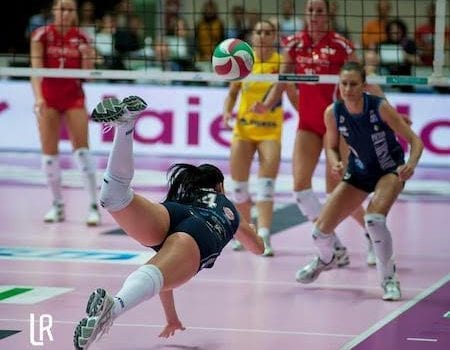
Volleyball Footwork: Lets Take the Next Step Together
Club SportsLEVELUP INSIDERSVOLLEYBALL — Served by NCVA May 20, 2020 Lindsey Berg 0

Hi all, Lindsey Berg here! In my last blog we dove into the importance of proper volleyball footwork. Like in all sport, footwork leads to efficiency and effectiveness. You can say, it’s a critical first step toward mastering your position.
As I mentioned last time, to be efficient means achieving maximum productivity with minimum wasted effort or expense. It’s one thing to say, “Get to the ball faster,” but at the end of the day if you are efficient with your steps you will get there as fast as you can.
So, lets take the next volleyball footwork step together
FAR OUT-OF-SYSTEM PASS
If the pass is really bad, run as fast as you can to get your feet to the ball. This gives you the best chance to get square to the net. You may not be able to, but you definitely won’t if you don’t go full speed.
_______________________________
#NEVERSTOP STAYING CONNECTED:
Follow SportStars on Twitter & Instagram | Like us on Facebook | Subscribe!
_______________________________
When the ball is this far off, you may have to bump set. A good way to gauge whether you have time to set the ball with your hands or go to the bump is whether the ball is above or below your chest. Above, use your hands. Below, use the bump.
Your best results in this situation will come if you can be fully stopped before you contact the ball with your platform, but this isn’t always possible. But either way, your sets will be more consistent if you use your legs so you can get a down-up motion. That’s something I learned from one of my coaches on the U.S. team, Toshi Yoshida, and it’s a great tip for all setters.
Be sure to finish your platform motion where you want the ball to go. This is especially important on the plays where you don’t have time to stop and have to run through the ball.
FAST PASS ONE STEP OFF THE NET
This is a little more advanced volleyball footwork, but if a pass is coming to you low and a step off the net, you can take one step with your left as you pivot to face the target. This is a good trick to have in your repertoire.
The positives of being efficient to the ball are endless. Setters, like middle blockers, are constantly moving. It’s always a plus to save energy when you can. It is inevitable that the setter will run around all game. But unnecessary steps prevent you from saving energy, which could come in handy during long matches, tournaments and seasons.
At the end of the day, you can work on these steps over and over again, but if you think too much about the technique rather than just moving to the ball it could be a problem. So just get to the ball as fast as you can, then set a hittable ball. Easy, right? Wink!
VOLLEYBALL FOOTWORK- SAVING STEPS BY READING THE GAME
Another way to move efficiently is being able to read your own passer’s platform. Let’s say you’re in Rotation 1 in serve-receive behind your outside, standing in right back. Some players are taught to run to the net and then come off the net to set. But if you can read your passer’s platform and see that, say, it’s outside of their body and their shoulders are up, you can determine that the ball is not going to the net and you can save steps, quickly changing your route. Again, different coaches want different things, but your path to the ball will be much more efficient when you get to a level where you can read the passer’s platform.
Being able to read your own passer helps you stay in system even when you’re off the net because if you get your feet to the ball, you can run anything. If you’re late to the ball, you’ll have to bump set or set a high ball or set the back row. You can also judge if the ball is going to the far right side of the court and avoid running to the middle of the net and then having to scramble backward to make the set. This keeps all of your setting options on the table.
READ THE PLATFORM
How to read the platform is quite simple once you get the hang of it. If the platform is facing directly to you, more than likely it will end up in your vicinity. If the player’s platform is facing to the left, it will head in that direction. Same with the right. Lastly if you see the player lift up with a high platform, the ball will likely go up. It takes time to get better at this, and be at a level that you have the time to take in all of these factors. But you will get there, I promise!

Lindsey Berg founder of “THE CUORE PROJECT”. An all-digital programming network featuring films, editorials, and podcasts with the mission to share stories and information to educate and inspire the next generation of female volleyball athletes.
[bsa_pro_ad_space id=22]





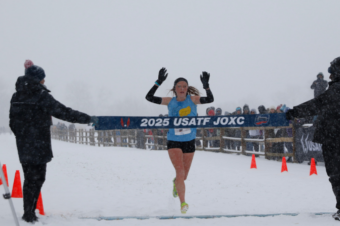
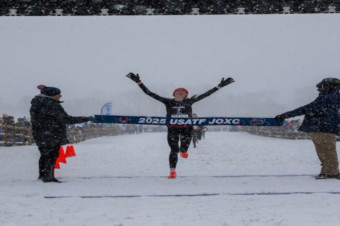
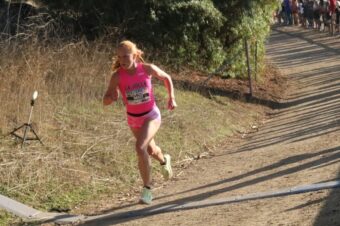

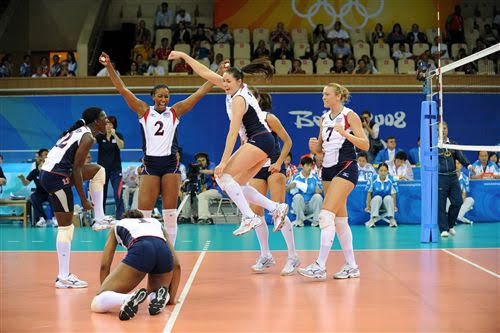
No comments so far.
Be first to leave comment below.